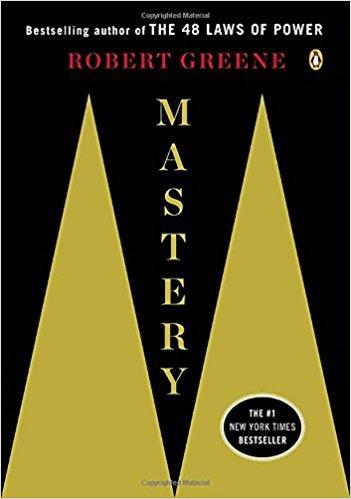Mastery Summary

7 min read ⌚
 Myths About Genius and What It Really Means To Be Great
Myths About Genius and What It Really Means To Be Great
You do not need superhuman intelligence and talent to reach “Mastery.”
All you need is devotion and patience while following a specific set of already established steps.
Who Should Read “Mastery”? And Why?
“Mastery” aims to dispel some of the most common and prevalent beliefs which may hinder a man’s development and rise.
If you believe that you are unable to achieve greatness due to an inherent lack of talent – then this book is the one you should read. It will teach you that mastery is almost an antonym to talent and that all those years you felt frustrated due to not advancing owe nothing to lack of qualities but all to lack of discipline and proper planning.
Needless to add, novices who have never even walked this path are even more advised to add “Mastery” to their must-read lists. The same holds true for anyone who knows not what to do with his or her life – and believes that his best years for learning are behind him/her.
Regardless of whether he/she has just left high school or is in a middle-life crisis.
About Robert Greene
 Robert Greene is a famous and widely admired American author. The younger son of Jewish parents, he earned a degree in classical studies from the University of Wisconsin and worked at least 80 different jobs before becoming a successful writer
Robert Greene is a famous and widely admired American author. The younger son of Jewish parents, he earned a degree in classical studies from the University of Wisconsin and worked at least 80 different jobs before becoming a successful writer
He is mostly interested in topics related to power, seduction, strategy, and dominance. Unsurprisingly, his debut book, “The 48 Laws of Power,” was very popular with rappers, athletes, and other celebrities, and sold more than a million copies
He followed this success with another controversial title, “The Art of Seduction,” which – according to Neil Strauss’ “The Game” – enjoys a cult status in the seduction community.
“The 33 Strategies of War” earned Greene the not-so-flattering title “a modern-day Machiavelli,” and his popularity resulted in “The 50th Law,” a book he co-wrote with none other than 50 Cent.
“Mastery Summary”
Contrary to what you may believe, the extraordinary accomplishments of many great names you have heard about, are not a result of inborn talent.
In fact, there is no proof that talent and mastery are linked in any way.
In other words, one does not need an extremely high IQ to be a master. Mastery does not stream from talent.
Instead, it comes from devotion.
So what are the steps that ordinary people can take to become masters in a specific field?
Just learn from history.
The great masters that historical books talk about nowadays have all followed a similar pattern of development.
Each of them discovered their passion and interests, engaged in apprenticeship, developed their imagination and creativity, and then achieved mastery.
The times change, but the steps to mastery do not.
The good news: modern masters needn’t do anything else but the masters of the past.
But, before that – how do you find your field?
Simply put: listen to your gut!
If you have a feeling that some discipline was just made for you and that your destiny is to create a name for yourself in that field, trust that feeling.
But what if you are not able to hear that inner voice?
Well, first you need to reframe your mind.
When considering a job choice, stop assessing the promise of prestige or financial rewards you believe that that job offers. Instead: start noticing other rewards, such as gaining experience in a specific field. This will serve you for years to come.
Of course, the only prerequisite is that you’re really interested in the discipline you practice.
Moving forwards means one of two things: either you’re going to walk the long road of experimentation and failure, or just find a mentor to show you the shortcuts.
Think of it this way:
When you were a child, you knew nothing about the world and you needed your parents to show you the way.
And when we say nothing, we are talking about that one time you wanted to put your fingers in the power socket just beacuse there were two holes in it!
Well, the same is true for “the adult novice you” as well – regardless of whether it comes down to much more delicate things such as playing the piano or scientific endeavors such as neuroscience.
In the beginning, you know nothing about it.
So, act like it!
“The greatest mistake you can make in the initial months of your apprenticeship,” writes Greene, “is to imagine that you have to get attention, impress people, and prove yourself. These thoughts will dominate your mind and close it off from the reality around you.”
The point?
Never forget the benefits of being a wallflower!
Remember the story of Socrates?
He didn’t say that he knew nothing because he knew nothing. He said it because he wanted to see how much the people he talked with knew.
It’s difficult to be passive – but deep observation is about the most passive thing you can do. And it’s really important when it comes to your apprenticeship.
In fact, that’s phase 1.
Phase 2 is the practice mode.
“Too many people believe that everything must be pleasurable in life,” says Greene, “which makes them constantly search for distractions and short-circuits the learning process.”
In fact, becoming a master is almost never a pleasurable process. It’s – sorry to burst your bubble there, but, just like Greene, we aren’t mincing our words either – boring.
To quote Greene:
“The initial stages of learning a skill invariably involve tedium. Yet rather than avoiding this inevitable tedium, you must accept and embrace it. The pain and boredom we experience in the initial stage of learning a skill toughens our minds, much like physical exercise.”
How painful and how boring?
About 10,000 hours of it.
Which amounts to about five hours a day of deliberate practice for more than five years! That’s right – until your fingers start bleeding or your mind starts dreaming up neocortices in the middle of the day.
And this is where your mentor walks in, possibly world-weary, but all wise and brilliant nevertheless.
Because if you’ve watched any Bruce Lee movie, “Kickboxer,” or “Star Wars” you already know by now that no matter how good you are, you always need a mentor
Remember the power socket?
Well, your mentor has been there, done that. And he’ll tell you not to do it.
10,000 hours later and a bunch of never-forget-any advices from our mentor, you will be able to move on to phase 3. That one, finally, is the active phase. Mode: experimentation.
It means opening your mind and shutting up your fears. It means breaking the bonds from your mentor and start doing things your way.
Namely, the way nobody has every done them before.
Be brave and challenge yourself.
Routines are for the ordinary; challenges are for the outstanding.
Key Lessons from “Mastery”
1. The Path to Mastery
2. Recognize Your Uniqueness
3. Finding a Mentor
The Path to Mastery
If you want to become a master, you don’t need things such as inborn talent – that is a myth. What you need is a lot of passion, dedication and many hours of practice.
The path to mastery has always been the same.
First, you need to discover your calling – which usually means digging deep inside your past.
Then, it means choosing an appropriate job which will allow you to observe deeply the practices of those who have done for years what you want to be doing in the future.
Thirdly – and related – it means choosing a mentor which will help you practice better. And, my god, you will need to practice – deep, deliberately, and about ten thousand hours of it.
Yes, it’s boring.
But after the passive and practice mode, comes finally the active phase: experimentation. This is the moment you’ve been waiting for. Start doing things your way.
Open your mind.
Outmaster your mentor.
Become a master yourself.
Recognize Your Uniqueness
We are all unique. However, we do not act like it.
Instead, we try hard to blend in, hoping that following the crowd will keep us away from trouble.
Blending in is easier, but if you do not recognize your uniqueness, you will never find your inner calling.
Finding a Mentor
Learning new things is a difficult task.
However, there is an easier way: finding a mentor.
A mentor is someone who guides you and shows you how you can use your skills and time better.
You are not the only one benefitting from such a relationship – the mentor does too.
Like this summary? We’d Like to invite you to download our free 12 min app, for more amazing summaries and audiobooks.
“Mastery” Quotes
The future belongs to those who learn more skills and combine them in creative ways. Share on X No one is really going to help you or give you direction. In fact, the odds are against you. Share on X The time that leads to mastery is dependent on the intensity of our focus. Share on X Become who you are by learning who you are. Share on X The passive ironic attitude is not cool or romantic, but pathetic and destructive. Share on X
Our Critical Review
A divisive figure, Greene is often called a manipulative and amoral writer. Even so, his books are extremely popular. “48 Laws of Power,” for example, has been referenced in Jay-Z and Kanye West’s “Primetime” and Drake’s “What I’m Thinkin’ Right Now.”
Supposedly, even Fidel Castro read and loved that book!
Unfortunately, it’s quite difficult to expect such a success from “Mastery.” Compared to all other books written by Greene, “Mastery” is pretty mellow – not to mention unoriginal. Even though it is yet again structured in a way which makes for both an easy read and a long-term memory project, it rarely says something which you don’t know already from books such as Malcolm Gladwell’s “Outliers.”
Namely – that masters are made, not born, and that you need 10,000 hours and a good mentor to become one yourself.
Neither controversial, nor essential, “Mastery” can still change your life – for the much better. Mainly because Greene – as always – is once again realistic and down-to-earth (as few self-help authors are).
Theoretically, you should be able to succeed in anything you set your mind upon. But, practically, it’s best if you take few of Greene’s Darwinian suggestions and find the perfect intersection between your calling and the needs of the market.
It’s quite easy tfrom thereon: just start walking the path to mastery.







